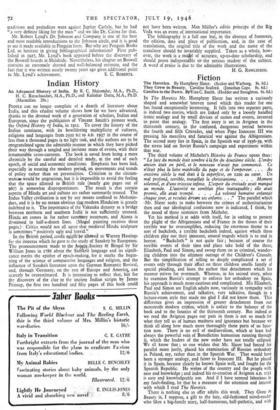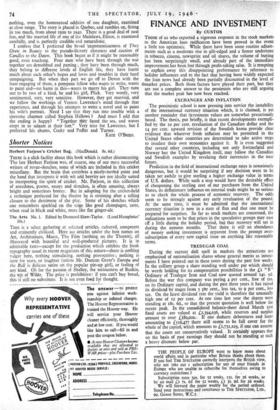Fiction
IN The Heretics Mr. Humphrey Slater has written a curiously shaped and somewhat Anieven novel which this reader for one
has found exceptionally interesting. It falls into two separate parts, is indeed two stories, which are linked only by a loosely handled ironic analogy and by small devices of names and events, invented
to point that analogy. The first story is set, in Avignon in the thirteenth century, in the confused, dangerous period between the fourth and fifth Crusades, and when Pope Innocent III was pressing his merciless and fanatical war against the Albigensians. The second story lies in Spain, in the Spanish war of 1936-39, with the stress laid on Soviet Russia's campaign and experiment within that war.
The third volume of Michelet's Histoire de France opens thus: "La face du monde etait sombre a Id fin du douzieme siecle. L'ordre ancien itait en peril, et le nouveau n'avait pas commence.. Ce n'itait plus la lutte materielle du pape et de rempereur. . . . Au onzieme siècle le mal emit a la superficie, en 1200 au cceur. Un mal profond, terrible, travaillait le christianisme. . . . Moment solennel, et d'une tristesse infinie. L'espoir du croisade avait manqué au monde. L'autorite ne semblait plus inattaquable ; elle avait promis, elle avait tromps. . . . La volorue humaine enfantait chaque jour, et reculait devam ses enfants. . . ." The parallel which 'Mr. Slater seeks to make between the crimes of authoritarianism then and our icleologic41 confusions now is indicated, I think; by the mood of those sentences from Michelet.
Yet his method is at odds with itself, for in seeking to present the plight of the Albigensians and of France in the throes of their terrible war he oversimplifies, reducing the enormous theme to a sort of backcloth, a terrible backcloth indeed, against which three children play out their innocent, amoral tragedy which' is to end in horror. " Backcloth " is not quite fair ' - because of course the terrible events of their time and place take hold of the three, Elizabeth, Paul and Simoni and sweep them on as criminal, wander- ing children into the ultimate outrage of the Children's Crusade. But the simplification of telling so deeply complicated a set of events only through their effect on three children smells faintly of special pleading, and loses the author that detachment which his manner strives for overmuch. Whereas, in his second story, when he examines Russia's attempt to enforce her orthodoxy on Spain, his approach is much more cautious and complicated. His Elizabeth, Paul and Simon are English adults now, variously in sympathy with Russia's achievement, and talkative, very talkative, though in a lecture-room style that made me glad I did not know them. This difference gives an impression of greater detachment from our monstrous Modem criMes, which is unfair to the balance of the book and to the fanatics of the thirteenth century. But indeed as we read the Avignon pages our pain in them is not so much for what they tell us of human madness and ignorance but because we think all along how much more thoroughly these parts of us func- tion now. There is no evil of mediaevalism, which at least had always the powerful vein of Benedictine humanism running through it, which the leaders of the new order have not totally eclipsed. We all know that ; so one wishes that Mr. Slater had forced his parallel more justly, placed his examination ot Russian orthodoxy in Poland, say, rather than in the Spanish War. That would have been a stronger analogy, and fairer to Innocent III. But he placed it in Spain, because clearly he knows Spain well, and fought for the Spanish Republic. He writes of the country and the people with ease and knowledge • and indeed his re-creation of Avignon A.D. 1212 is easy and knowledgeable too. And if I have seemed laborious in my fault-finding, let that be a measure of the attention and interest with which I read The Heretics.
There is nothing else to offer adults this week. They Grew in Beauty is, I suppose, a gift to the lazy, old-fashioned novel-reader who likes a big-family story, half-humorous, half-pathetic, and with nothing, even the homosexual oddities of one daughter, examined ,at close range. The story is placed in Quebec, and rambles on, fitting "in too much, from about reloo to 194o. There is a good deal of neat fun, and the married life of one of the Mainlaws, Elinor, is examined carefully, and is perfectly credible and naturalistic.
I confess that I preferred the broad -unpretentiousness of They Grew in Beauty to the pseudo-literary closeness and caution of Candles to the Dawn. This book began as if it might be reasonably good, even touching. Four men ' who have been through the war together are demobbed and parting ; they have been through much, they belong to different levels of English life, they have learnt much about each other's hopes and loves and troubles in their hard campaigning. But when the3r part we go off to Devon with the least engaging of them, a pompous fellow who wants to write, wants to paint and—no harm in this—wants to marry his girl. They turn out to be two of a kind, he and his girl, Flick. Very wordy, very sentimental, very, very sensitive. However, they get married, and we follow the workings of Vernon Lawrence's mind through that experience, and through his attempts to write a novel and to paint his wife's portrait. Need I say that they run into trouble with a tiresome charmer called Stephen Hallows ? And must I add that the ending is happy? " Together they faced the sea, and waves crept in to salaam at their feet." Very nice for Lawrence, but I preferred his chums, Cocky and Pedlar and Turner.
KATE O'BRIEN.



























 Previous page
Previous page